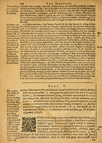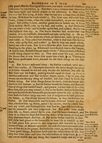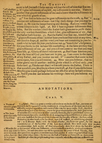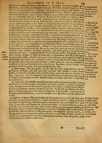Curing a bedred man at the pond of miracle, because he doth it on the Sabboth, the blind Jews do persecute him. (7) And again because he saith that God is his natural father. (19) He thereupon continueth saying, the Father’s operation and his to be in everything all one, and that he shall do greater things than these miraculous cures, to wit, (21) quicken the dead in soul by sin, as being appointed Judge of all, (28) yea and quicken the dead in bodies also, incontinent judging all uprightly. (31) And that these are not brags of his own but his witnesses to be. (33) John Baptist, (36) his own miraculous works, (37) his Father’s voice at his Baptism, (39) the Scriptures also, namely of Moyses.
AFTER these things there was a festival day of the Jews, and Jesus went up to Hierusalem. 2And there is at Jerusalem ‘upon’ [a] Probatica a • pond which in hebrew is surnamed ‘Bethsaida’, having five porches. 3In these lay a great multitude of sick persons, of blind, lame, withered, expecting the stirring of the water. 4And an Angel of our Lord descended at a certain time into the pond: and the water was stirred. And he that had gone down first into the pond after the stirring of the water, was made whole of whatsoever infirmity he was holden. 5And there was a certain man there that had been eight and thirty years in his infirmity. 6Him when Jesus had seen lying, and knew that * he had now a long time, he saith to him: Wilt thou be made whole? 7The sick man answered him: Lord, I have no man, when the water is troubled, to put me into the pond. For while I come, another goeth down before me. 8Jesus saith to him: Arise, take up thy bed, and walk. 9And forthwith he was made whole: and he took up his bed, and walked. And it was the Sabboth that day. 10The Jews therefore said to him that was healed: It is the Sabboth, thou maist not take up thy bed. 11He answered them: He that made me whole, he said to me, take up thy bed, and walk. 12They asked him therefore, what is that man that said to thee, take up thy bed, and walk? 13But he that was made whole, knew not who it was. For Jesus shrunk aside from the multitude standing in the place. 14Afterward Jesus findeth him in the Temple, and said to him: Behold thou art made whole: • sin no more, lest some worse thing chance to thee. 15That man went his way, and told the Jews that it was Jesus that made him whole. 16Thereupon the Jews persecuted Jesus, because he did these things on the Sabboth.
17But Jesus answered them: My father worketh until now; and I do work. 18Thereupon therefore the Jews sought the more to kill him; because he did not only break the Sabboth, but also he said God was his Father, making himself aqual to God. 19Jesus therefore answered, and said to them: Amen, amen I say to you, The Son can not do anything of himself, but that which he seeth the Father doing. For what things soever he doeth, these the Son also doeth in like manner. 20For the Father loveth the Son, and showeth him all things that himself doeth, and greater works than these will he show him, that you may marvel. 21For as the Father doth raise the dead and quickeneth; so the Son also quickeneth whom he will. 22For neither doth the Father judge any man; but all judgement he hath given to the Son, 23that all may honour the Son, as they do honour the Father. He that honoureth not the Son, doth not honour the Father, who sent him. 24Amen, amen I say to you, that he which heareth my word, and believeth him that sent me, hath life everlasting; and he cometh not into judgement, but ‘shal pass’ from death into life. 25Amen, amen I say to you, that the hour cometh, and now it is, when the dead shall hear the voice of the Son of God, and they that have heard, shall live. 26For as the Father hath life in himself; so he hath given to the Son also to have life in himself; 27and he hath given him power to do judgement also because he is the Son of man. 28Marvel not at this, because the hour cometh wherein all that are in the graves, shall hear his voice, 29and they that have [b] done good things, shall come forth into the resurrection of life; but they that have done evil, into the resurrection of judgement. 30I can not of myself do anything. As I hear so I judge; and my judgement is just, because I seek not my will, but the will of him that sent me. 31If I give testimony of myself, my testimony is not true. 32There is another that giveth testimony of me: and I know that the testimony is true which he giveth of me.
33 * You sent to John; and he gave testimony to the truth. 34But • I receive not testimony of man: but I say these things that you may be saved. 35He was the lamp burning and shining. And you would for a time rejoice in his light. 36But I have a greater testimony than John. For the works which the Father hath given me to perfit them: the very works themselves which I do, give testimony of me, that the Father hath sent me. 37And the Father that sent me, himself hath * given testimony of me: neither have you heard his voice at any time, nor seen his shape, 38and his word you have not remaining in you; because whom he hath sent, him you believe not. 39 • Search the [c] scriptures, for you think in them to have life everlasting; and the same are they that give testimony of me; 40and you will not come to me that you may have life. 41Glory of men I receive not. 42But I have known you, that the love of God you have not in you. 43I am come in the name of my Father, and you receive me not; if [d] another shall come in his own name, him you will receive. 44How can you believe, that receive glory one of another; and the glory which is of God only, you seek not? 45Think not that I will accuse you to the Father. There is that accuseth you, Moyses, in whom you trust. 46For if you did believe Moyses; you would perhaps believe me also. For of me he hath written. 47And if you do not believe his writings: how will you believe my words?
Footnotes
- ↑ By our Latin text and the Greek, this miraculous pond was in or upon Probatica, that is, a place where the sheep to be sacrificed, were kept. But by other Latin copies, St. Hierom, and some Greek Fathers, Probatica is the very pond itself: so called because the sheep of sacrifice were there washed.
- ↑ Not faith only, but good and ill deeds shall be counted, and accordingly rewarded at the day of judgement.
- ↑ Catholics search the scriptures, and find there, Peter’s and his Successor’s Primacy, the Real presence, the Priest’s power to forgive sins, Justification by faith and good works, Virginity preferred before matrimony, breach of the vow of continence damnable, Voluntary poverty, Penance, alms, and good deeds meritorious, diverse rewards in heaven according to divers merits, and such like.
- ↑ He meaneth specially Anti-christ. How then can the Pope be he, seeing the Jews receive him not.
ANNOTATIONS. CHAP. V.
↑ 2. A pond.) This is as great a wonder and work as was in the old Law, yet never recorded in the Scripture before: the conditions and circumstances of the same much to be distinctly weighed against the miscreants of this time for many causes. First, that God without derogation to his honour, yea to the great commendation of it, doth give virtue of miracles and cure to water or other creatures. Secondly, that he giveth such virtues to these creatures specially which be by use and occupying in sacred functions or otherwise, as it were sanctified: for this pond was it wherein the carcasses of sheep (therefore called Probatica) and other beasts to be sacrificed, were first washed, to which being always red (as St. Jerom saith) with the blood of hosts, this force was given, for the commendation of the Sacrifices of the Law there offered. How much more may we acknowledge such works of God miraculously done in or about the Sacrifice or Sacraments of the new Testament, which faithless men wholly reject and condemn for fables, because they know not the Scriptures nor the power of God. Thirdly, that this operation was given at one time more than another, and rather on great festival days than other vulgar times (for this was the feast of Pasch or of Pentecost) as days more sanctified, and when the people made greater concourse: which showeth that we should not wonder to see miracles done at the Memories and feasts of Martyrs or other great Festivities, more than at other places and times. Fourthly, that the Angels or some special Saints are Presidents or Patrons of such places of miracle, and workers also under God of the effects that there extraordinarily be done. Which ought to make Christians less doubt, that the force of diverse waters in the world is justly attributed by our forefathers and good stories to the prayers and presence of Saints, which profane incredulous men refer only to nature, untruly pretending that God is more glorified by the works of nature, which be of his ordinary providence, than by the graces of Miracle given to his Saints or Angels by his extraordinary providence. Fifthly, that miracles be not wrought on men by their faith only and as well by their presence in spirit as in body, or upon the party’s desire or devotion only, according to the Heretics pretext that God is alike present by his power and grace to every man and place: and therefore that men need not to go from their own houses or countries to seek holiness or health at the places of Christ’s or his Saint’s birth, death, memories: for none could have benefit of this water but he that could touch it, and be in it corporally, and at that just time when the water was in motion by the Angel. Yea sixthly, we may consider that in such cases to make the matter more marvellous, rare and more earnestly to be sought for, and to signify to us that God hath all such extraordinary operations in his own will and commandment, without all rules of our reasons and questioning thereon, none could be healed but that person who first could get into the pond after the Angel came and stirred the same. Seventhly, that these graces of corporal cures given to this water, * prefigure the like force of the Sacrament of Baptism for the cure of souls, though we need not seek correspondence thereof to the figure in every point. Lastly, Christ by his power of excellence and prerogative could and did heal this poor man that could get no body to help him into the water, because he earnestly and long desired the remedy by God appointed, but was excluded by necessity: as our Lord saveth all such as die without Baptism, if they in their own persons earnestly intended, desired and sought for the same.
↑ 14. Sin no more.) We may gather hereby that this man’s long infirmity was for punishment of sins, and that men often attribute their sickness to other natural defects, and seek for remedies of the world in vain, when the sin for which it was sent, remaineth, or is not repented of: and therefore that in all infirmities men should first turn to God and go to their Ghostly father, and then call for the wordly Physicians afterward.
↑ 34. I receive not.) Our Master meaneth that man’s testimony is not necessary to him, nor that the truth of his Divinity dependeth on worldly witnesses, or men’s commendations: though to us such testimonies be agreeable and necessary. And so for our instruction he vouchsafed to take the testimonies of John the Baptist and Moyses and the Prophets: and departing out of this world, to send forth all his Apostles, and in them all Bishops and Lawful Pastors, to be his witnesses from Jerusalem to the ends of the world.
↑ 39. Search the scriptures.) He reprehendeth the Jews, that reading daily the Scriptures and acknowledging that in them they should find life and salvation, they yet looked over them so superficially that they could not find therein him to be CHRIST their King, Lord, Life and Saviour. For the special masters and Scribes of the Jews then, were like unto our Heretics now, who be ever talking and turning and shuffling the Scriptures, but are of all men most ignorant in the deep knowledge thereof. And therefore our Master referreth them not to the reading only or learning them without book, or having the sentences thereof gloriously painted or written in their Temple, houses, or coats: but to the deep search of the meaning and mysteries of the Scriptures, which are not so easily to be seen in the letter.
Margin Notes
- intro. The 2 part: The Acts of Christ in Jewry (having already begun his solemn Manifestation in Galilee. Mat. 4, 12) the second Pasch of his preaching.
- 1–15. The Ghospel upon Ember Friday in the first week of Lent.
- 25–29. The Ghospel upon All Souls day.
- annot. 2. a pond.
- 1. Virtue of miracles given to creatures.
- 2. The same given specially to sanctified creatures.
- 3. Miracles done at one time more than another, specially in greater solemnities.
- 4. Angels and Saints patrons and workers in place of miracles.
- 5. Miracles in certain places, and wrought upon them that corporally visit the same. See St. Augustine ep. 137.
- 6. All reasoning in these matters must yield to God’s pleasure.
- 7. This water is a figure of Baptism.
- 8. Christ extraordinarily healeth and saveth without creatures.
- annot. 14. sin no more. Sin the cause of sickness and infirmity.
- annot. 39. search the scriptures. Neither Jews nor Heretics find the truth, because they search not the Scriptures deeply, but read superficially.
Margin References
- 2. ‵ Bethesda
- 6. multum tempus haberet
- 33. Joh. 1, 19.
- 37. Mat. 3, 17.
- annot. 2. a pond.
- Jerom de locis Heb. post med.
- Hiero. cont. Lucifer c. 3. to. 2.




